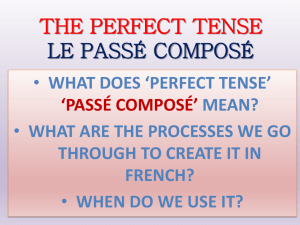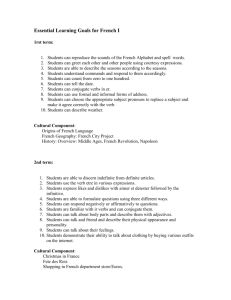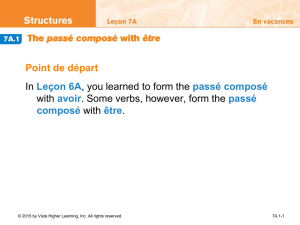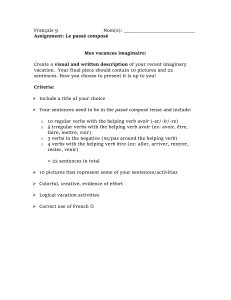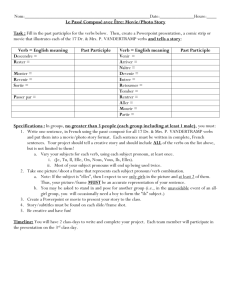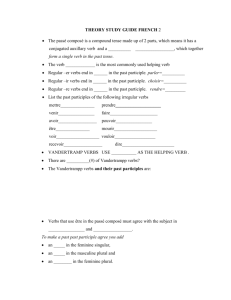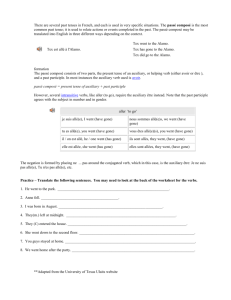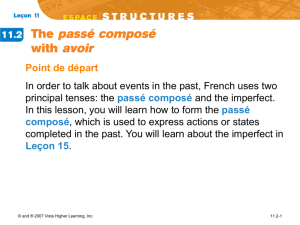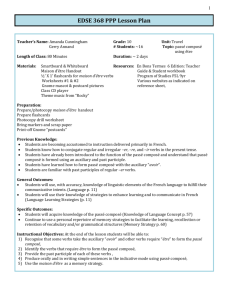Steps: Passé Composé
advertisement
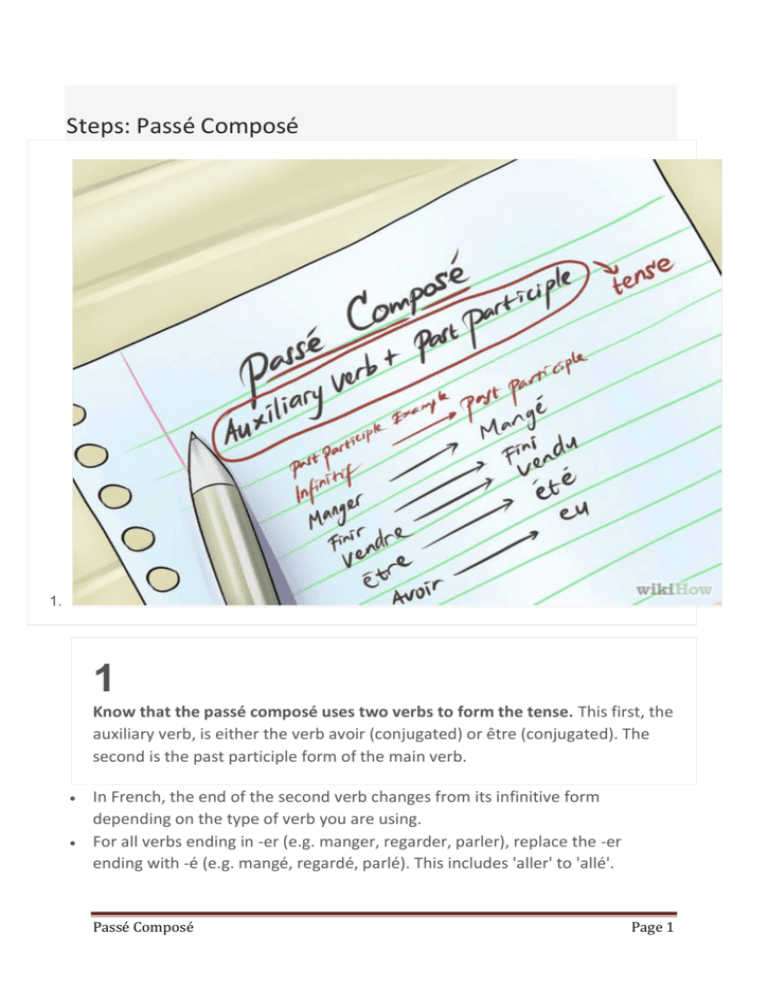
Steps: Passé Composé 1. 1 Know that the passé composé uses two verbs to form the tense. This first, the auxiliary verb, is either the verb avoir (conjugated) or être (conjugated). The second is the past participle form of the main verb. In French, the end of the second verb changes from its infinitive form depending on the type of verb you are using. For all verbs ending in -er (e.g. manger, regarder, parler), replace the -er ending with -é (e.g. mangé, regardé, parlé). This includes 'aller' to 'allé'. Passé Composé Page 1 For regular verbs ending in -ir (e.g. finir, choisir), remove the 'r' (e.g. fini, choisi). This excludes irregular verbs like 'souvenir'. For regular verbs ending in -re (e.g. répondre, vendre, attendre), you need to replace the end with -u (e.g. répondu, vendu, attendu). This excludes irregular verbs like 'battre'. Like in English, French has many irregular past participles. You just have to study them, although there are patterns you can find. Some of these are: mettre --> mis ; naître --> né ; courir --> couru ; prendre --> pris. Most irregular verbs ending with -oir in the infinitive end with -u in the past participle: vouloir --> voulu, pouvoir --> pu, savoir --> su, voir --> vu. Passé Composé Page 2 2 Learn that you form most of the verbs in the past tense with the auxiliary verb avoir . For a simple trick you can cut off the end of the verb you need to conjugate; as an example, we'll use the verb manger (eat): J'ai mangé, Tu as mangé. The verb avoir is conjugated thus: J'ai Tu as Il/elle/on a Nous avons Vous avez Ils/Elles ont 1. Passé Composé Page 3 3 Study the verbs that use être. These are: monter (to go up) and its derivative remonter; rester (to stay); venir (to come) and its derivatives revenir, parvenir, devenir, etc; aller (to go); naître (to be born); sortir (to go out); tomber (to fall); retourner (to return); arriver (to arrive); mourir (to die); partir (to leave) and its derivative repartir; entrer (to come in/enter) and its derivative rentrer; descendre (to go down) and its derivative redescendre. These verbs are called "intransitive" verbs; i.e. they can't have any grammatical objects. An example in English is 'to go'. You cannot "go something" as you could "eat something" or "finish something", can you? So that verb cannot take an object and therefore needs to use être instead of avoir. Je suis Tu es Il/Elle/On est Nous sommes Vous êtes Ils/Elles sont Passé Composé Page 4 1. 4 Also, all reflexive or reciprocal verbs use être as their auxiliary when conjugated in the passé composé (e.g. Elle se lave --> Elle s'est lavée). You must put the reflexive or reciprocal pronoun between the subject and the être: Jean s'est brossé les dents. Passé Composé Page 5 2. 5 The extra difficulty when you use être is that the past participle needs to agree with the subject. This is to say that you must add -e if the subject is feminine and -s if it is plural. The 'e' always comes before the 's'. Let's say you want to translate "I went". If you take the former method, you should translate it as "I have gone" - but this time you cannot use 'avoir' because there is no object in this sentence. So, "I have" will become "I am" (Je suis) and then you add the past participle, just like we've done before, plus the agreement, if necessary.[1] As an example we'll use the verb aller (to go): Je suis allé(e), Tu es allé(e), Il est allé, Elle est allée, Nous sommes allé(e)s, Vous êtes allé(e)(s), Ils sont allés, and Elles sont allées. Passé Composé Page 6 3. 6 Know where to place your object pronouns. You must put your object pronouns between your subject and the avoir/être: J'y suis allé. Your past participle must agree with the direct object when the object comes before the transitive verb. For example, you must write 'Je les ai lavés'. Passé Composé Page 7 4. 7 Form negatives around the auxillary verb; e.g. Je ne suis pas allé à Paris. Tu n'as pas mangé? Passé Composé Page 8
